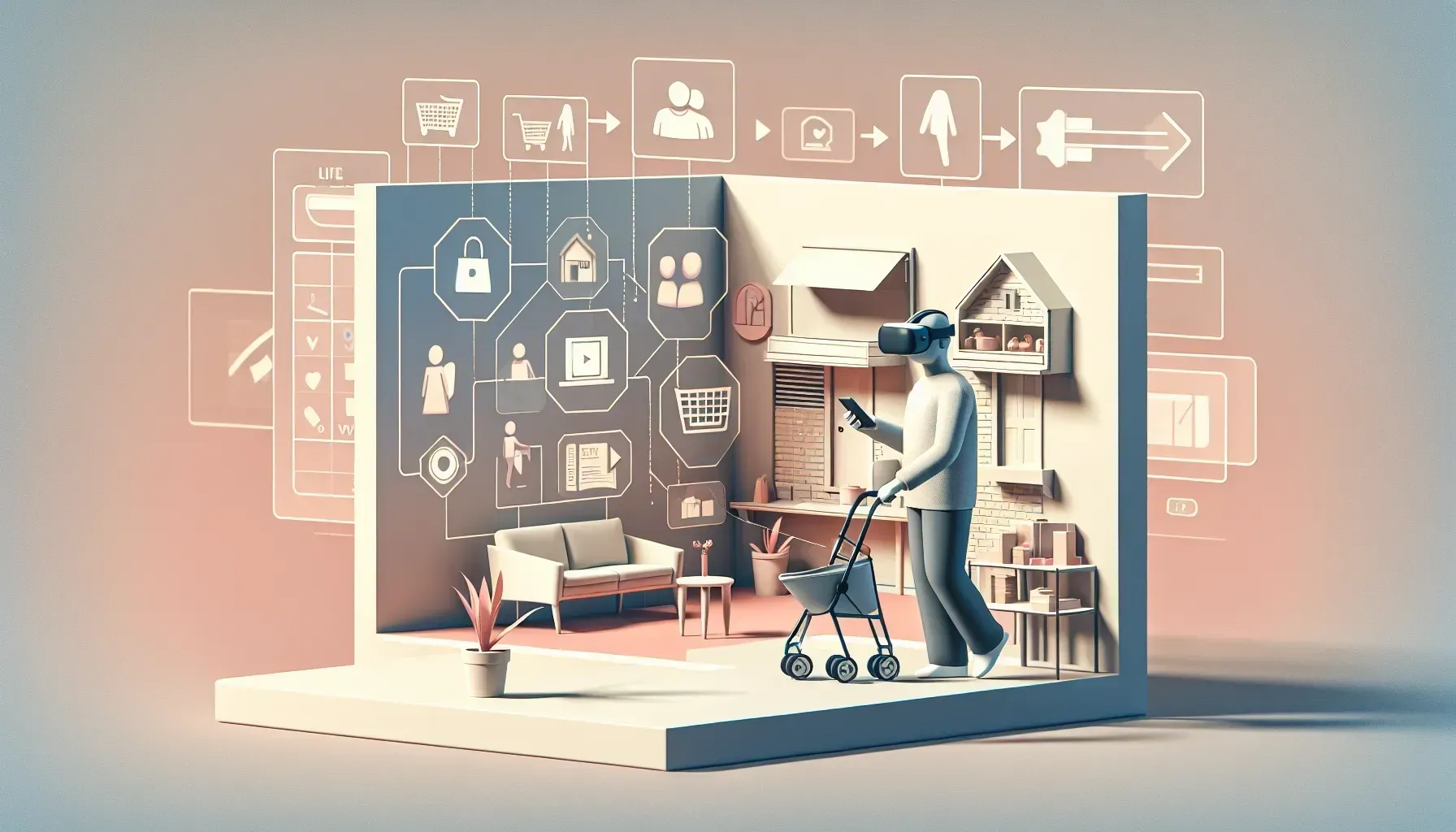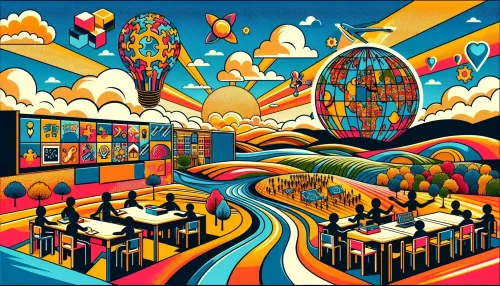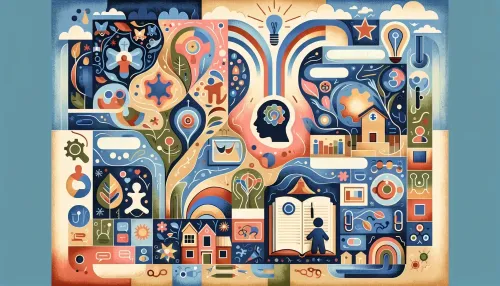Virtual Reality Workshops: Hands-on Learning for Life Skills Development

Virtual reality (VR) has ushered in a groundbreaking era for hands-on learning, particularly in the context of special education for autistic children. This innovative technology is being harnessed to create simulated real-world scenarios, offering a safe and controlled environment for individuals on the autism spectrum to develop essential life skills. Let’s delve into how VR workshops are bridging the gap in life skills development and explore the success stories, customization, expert insights, parental involvement strategies, and partnerships with VR developers in special education.
Understanding Virtual Reality in Special Education
The power of virtual environments lies in their ability to replicate real-life situations in a controlled and customizable manner. For autistic learners, this translates to a safe space where they can practice and gradually master various life skills. Whether it's navigating a grocery store, using public transportation, or engaging in social interactions, VR workshops offer a realistic yet supportive platform for young individuals with autism to learn and grow.
How Virtual Environments Simulate Real-World Scenarios
Within the virtual setting, educators and therapists can design scenarios that mimic everyday tasks, allowing participants to familiarize themselves with different environments and situations. By immersing themselves in these simulated experiences, autistic learners gain exposure to challenging scenarios while receiving guidance and support, ultimately building confidence and competence in executing these tasks in the real world.
The impact of VR workshops on life skills development for autistic individuals is tangible and far-reaching. Success stories abound, highlighting remarkable progress in diverse areas such as shopping, public speaking, social interactions, and self-care routines. Through targeted VR interventions, individuals with autism are empowered to navigate shopping experiences independently, manage personal finances, practice effective communication in public settings, and hone presentation skills in a controlled environment designed to minimize anxiety and sensory overload.
Success Stories: VR Workshops Transforming Life Skills
These success stories underscore the transformative potential of VR workshops as catalysts for enhancing the independence and self-sufficiency of autistic learners across various facets of their daily lives. The adaptability of virtual reality allows for personalized learning experiences tailored to the specific needs and goals of each participant, fostering tangible advancements in crucial life skills that directly contribute to their overall well-being and quality of life.
One of the key strengths of VR technology in the realm of special education is its capacity for customization to cater to the diverse needs and sensitivities of autistic child learners. Immersive VR experiences can be tailored to accommodate individual preferences, sensory profiles, and developmental levels. By incorporating adjustable settings for audio-visual stimuli, spatial constraints, and interactive elements, VR workshops ensure that each participant receives an experience optimized for their unique requirements and comfort zone.
Moreover, customization extends to the content and goals of virtual reality scenarios, allowing educators and therapists to align activities with individualized education plans (IEPs) and specific learning objectives. This flexibility enables autistic children to engage with VR content that is purposefully designed to address their areas of challenge while capitalizing on their strengths, fostering a dynamic learning environment that caters to their distinct learning styles and abilities.
Customizing VR Experiences for Autistic Learners
As VR continues to gain traction as a valuable tool in special education settings, experts have identified an array of benefits associated with its implementation for autistic learners. From promoting experiential learning and improving engagement to honing social and practical skills within lifelike contexts, VR technology has demonstrated its capacity to enhance the educational experience for individuals on the autism spectrum.
However, it's crucial to recognize that along with its benefits, VR also presents certain limitations when integrated into special education practices. Factors such as accessibility, cost implications, technical expertise requirements for educators, and ensuring ethical use of immersive technologies are considerations that demand diligent attention. Navigating these challenges effectively involves collaborative efforts among educators, clinicians, technologists, and families to maximize the positive impact of VR while mitigating potential drawbacks through informed implementation strategies.
Expert Insights: Benefits and Limitations of VR Technology
The pivotal role of parents in supporting their children’s participation in VR learning cannot be overstated. Recognizing this essential partnership between home and school environments is fundamental in optimizing the outcomes of VR workshops for autistic learners. Parents are integral stakeholders in facilitating successful home-based virtual workshops aimed at nurturing life skills development within familiar surroundings.
Empowering parents with comprehensive guidance on incorporating VR activities into daily routines fosters a cohesive approach that reinforces skill acquisition beyond formal workshop sessions. By equipping parents with strategies for leveraging VR technology at home paired with ongoing communication with educators families can contribute significantly to consolidating the gains made during structured workshops. This collaborative model encourages continuity in skill reinforcement while fostering parental confidence in utilizing VR as a supplemental learning resource within domestic settings.
Parental Involvement: Strategies for Home-Based VR Learning
Sensory sensitivity is a hallmark feature of autism spectrum conditions, underscoring the critical importance of tailoring VR environments to mitigate sensory overload among participants. Adopting a meticulous approach to crafting VR experiences that accommodate hypersensitivities is instrumental in creating inclusive learning spaces where individuals feel supported rather than overwhelmed by sensory stimuli.
Through careful calibration of visual effects, soundscapes, tactile feedback elements, and environmental dynamics within virtual scenarios, educators can proactively address sensory triggers while optimizing engagement and comfort for autistic learners. By prioritizing user comfort through personalized sensory settings and providing avenues for self-regulation within virtual environments, VR workshops can effectively minimize sensory challenges while fostering an empowering atmosphere conducive to skill development.
The collaboration between schools or educational institutions and adept VR developers signifies a transformative trajectory in crafting impactful life-skills curriculum modules tailored for autistic learners. Establishing symbiotic partnerships enables educators to harness the expertise of VR developers in designing immersive experiences that align with specific educational objectives while encapsulating authentic real-world scenarios vital for life skills acquisition.
Related Article: Learning Adventure: Creative Educational Approaches to Cater to Autistic Childrens Diverse Learning Styles
Reducing Sensory Overload in VR Environments
By leveraging the proficiency of VR developers, schools can unlock opportunities to integrate cutting-edge technologies seamlessly into their curriculum frameworks tailored for individuals with autism. Furthermore a consultative approach wherein educators provide insights into the distinctive needs and goals of their students fosters an iterative process yielding bespoke VR content that resonates deeply with the target audience. This collaborative synergy yields curated modules that encapsulate cultural relevance, authenticity, and pedagogical efficacy a testament to the profound impact achievable when educational institutions proactively engage with skilled VR developers.
In conclusion virtual reality offers profound promise as an instrumental tool for nurturing life skills development among autistic children by delivering immersive, customizable scenarios proven vital through successful implementations worldwide. As parents engage proactively with educators or therapists embracing this pioneering medium we are poised collectively to elevate opportunities benefiting our remarkable community profoundly.
Frequently Asked Questions
Virtual environments simulate real-life situations, providing autistic learners a safe space to practice essential life skills. These workshops allow participants to navigate scenarios like grocery shopping or public transport, helping them gain confidence and competence in real-world tasks through guided experiences.
Success stories from VR workshops highlight improvements in various life skills among autistic individuals, including shopping independently, managing finances, and enhancing public speaking abilities. These workshops empower participants to engage in social interactions and self-care routines, significantly boosting their independence and self-sufficiency.
VR experiences can be tailored to meet the unique needs of autistic learners by adjusting audio-visual stimuli, spatial constraints, and interactive elements. This customization aligns with individual education plans (IEPs), ensuring that each participant engages with content designed to address their specific challenges and strengths.
VR technology enhances special education by promoting experiential learning and improving engagement among autistic learners. It helps develop social and practical skills within lifelike contexts, making the educational experience more effective. However, it also presents challenges that need careful consideration for successful implementation.
Parents play a crucial role in supporting their children's VR learning by facilitating home-based workshops. By incorporating VR activities into daily routines and maintaining communication with educators, parents help reinforce skills learned during formal sessions, creating a cohesive approach to skill development.
To reduce sensory overload, VR environments can be meticulously designed to accommodate hypersensitivities. Educators can calibrate visual effects, soundscapes, and tactile feedback elements to create inclusive spaces that prioritize user comfort while fostering engagement and skill development among autistic participants.
Schools collaborate with skilled VR developers to create impactful life-skills curriculum modules tailored for autistic learners. These partnerships leverage the expertise of developers to design immersive experiences that align with educational objectives, ensuring that the content is relevant and beneficial for students.
VR workshops help develop various life skills such as shopping independently, managing personal finances, effective communication in public settings, and self-care routines. These targeted interventions empower autistic individuals to navigate everyday tasks more confidently and competently in real-world situations.
While VR offers numerous benefits in special education, limitations include accessibility issues, cost implications, and the need for technical expertise among educators. Addressing these challenges requires collaborative efforts among stakeholders to ensure effective implementation while maximizing the positive impact of VR technology.
Check Out These Related Articles

Creative Problem-Solving: Crowdsourced Strategies in Educating Autistic Children

Neurodiversity in Education: Redefining Teaching Approaches for Autistic Students

School Days Simplified: Tailoring Education Plans for Autistic Students
